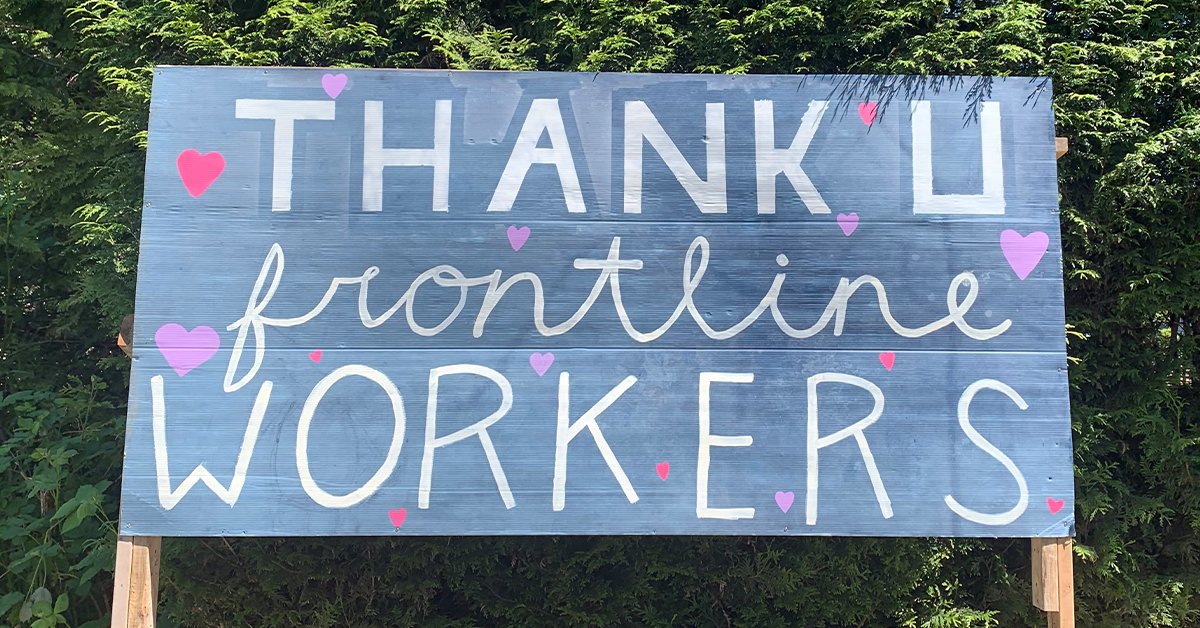
18 Jan Supporting the Mental Health of Frontline Workers During the COVID Pandemic
The COVID-19 pandemic has laid bare the massive stratification of our society. In March 2020, the world seemed to shut down overnight, as stay at home orders were issued and businesses of nearly every type shuttered or moved their operations online. While everyone else was sheltering in place at home, one group of people bravely ran toward the danger to protect and care for the rest of us and keep society functioning. “Essential workers,” from first responders and hospital staff to grocery store personnel and delivery drivers, have borne the brunt of the pandemic, and their mental health is suffering.
According to Mental Health America (MHA), a shocking but unsurprising 93% of essential workers are experiencing stress, with 86% reporting anxiety and 75% reporting feelings of being overwhelmed. More than three-quarters of these workers are afraid of passing the virus to their children, while almost half are worried about transmitting it to their spouse or older adults in their family. Emotional exhaustion, physical exhaustion, and even physical symptoms such as stomachaches and headaches are all common among essential workers.
Providing Support
Fortunately, there are ways to support our frontline workers during this extremely difficult time. Whether you have an essential worker in your life or simply want to show your support for these heroes, here are a few things you can personally do to help out:
- Stay home. The biggest thing you can do for healthcare workers is to avoid becoming a patient yourself, or causing someone else to need care. When you must go out, wear a mask, maintain safe physical distancing, and follow all relevant guidelines.
- Get vaccinated. COVID-19 vaccines are starting to roll out. They’re still limited at this point, but availability is expected to ramp up over the coming months. As soon as it’s your turn, get your shot. This will help reduce your risk of contributing to the overload that healthcare workers are facing.
- Donate. Whether you send extra PPE (personal protective equipment) to a hospital or buy pizzas for your local grocery store team, donating is a simple kindness that can help essential workers find the strength to keep going.
- Tip well. Whenever you interact with an essential worker, whether that person delivers your groceries or sells you a cappuccino, tip generously. Remember, they’re risking their own health for all of us.
- Write a note. Handwritten greetings are touching at any time, but for people who are stressed out, overwhelmed, and worried about their health, a genuine note of thanks can be a lifeline. Drop off handwritten cards at the hospital, send them to school with your kids, or pass them out at local businesses you frequent.
Resources for Frontline Workers
Many essential workers are currently facing mental health challenges that require more assistance than untrained community members can provide. If you have a frontline worker in your life, here are some resources to recommend:
- Apps. There are a plethora of mental health apps currently on the market. Popular choices include Calm, Headspace, and Moodfit. Calm and Headspace focus primarily on meditation and mindfulness, while Moodfit brings together a variety of tools to help you set goals and track your progress. All three offer both free and paid options.
- Employee Assistance Programs (EAPs). Not all employers offer an EAP, but it is worth asking. These programs typically offer a few free therapy sessions per year, and may also provide free tools for mental health and wellness.
- Crisis lines. Crisis lines are primarily designed to help those who are having thoughts of suicide, but they can also handle other mental health concerns such as panic attacks, depression, and anxiety. If your loved one is feeling especially overwhelmed, have him or her call the National Suicide Prevention Hotline at 1-800-273-8255 or text Hello to the Crisis Text Line at 741741.
- Free counseling. In some cities, mental health professionals have banded together to offer free counseling for frontline workers. Not all cities participate, and details vary, so it’s best to call your local health department to inquire about any programs that might be available near you.
The COVID-19 crisis has drastically upended life for everyone, and it’s the essential workers who are bearing a lot of the brunt. Fortunately, communities are coming together to support these frontline heroes in various ways. If you want to contribute, consider donating goods or services to local workers, send handwritten cards, or simply practice extra kindness. If you have a friend or family member on the front lines, encourage that person to take advantage of mental health apps, to look into his or her employer’s EAP program, and to seek professional help if needed.
Of course, the best thing you can do is to avoid becoming part of the problem. Stay home as much as possible, follow all relevant guidelines when you must go out, and take your COVID-19 vaccine as soon as it’s your turn. Ultimately, the best way to help frontline workers is to do your part to end the pandemic altogether.



Sorry, the comment form is closed at this time.